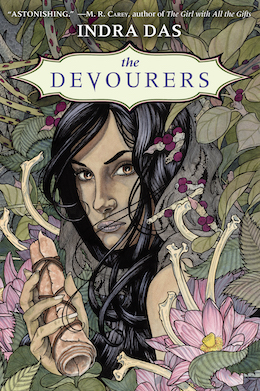The Devourers is lush and strange and putrid, a novel that is, if you cut it a certain way, mostly exposition; an entire history delivered by one character to another, recounted for the most bizarre and aching of reasons. It is a story about shapeshifters, gender issues, loneliness, and the conceit of humanity. It is a hard read, and one of my favorite books this year.
Have I mentioned it is also grotesque?
[Ed. Note: This article deals with a literary depiction of sexual violence.]
One of the best things about fiction is that we’re not required to consider the realism of a particular action. Unless you want to, there is no need to invent plausible faster-than-light travel, no need to consider the full ramifications of magic in modern Chicago, or how tails might precipitate an entire clothing industry. A work of fiction can simply be.
Having said that, there’s a power to acknowledging life’s greasy viscera, a fact that The Devourers understands well. For all of the beauty of the prose, it also reeks of vomit and urine and blood, of opened guts and animal appetite. A charnel stench clings to every paragraph, trailing its bestial cast. While it might initially seem gratuitous, the nauseating confection does work to the book’s advantage, cementing our understanding that this is the world as we know it – dark and gritty and terrible behind our veneer of civilization.
And Das doesn’t hold back here. It is interesting how much his approach differs from Hollywood’s conception of splatterpunk. For all of the grotesquerie we see in popular media, we’re rarely treated to the full impact of death. Hangings are simple: a tilted head, a limp body. Disembowelments are reams of intestines, stomach and bladder sluicing from a gaping cavity. Gross, yes, but strangely clean, at the same time. Rarely do we witness the piss and the feces, the bulging stares, the messiness of our biological ends.
Needless to say, that’s not the case here. And Das fills his world of hungry shapeshifters with all the secretions of life. They are rancid from their travels. They trail flies like funeral veils. Theirs is a reality often too harsh for a world fearful of its own mortality.
That said, gore is easily misused. Despite the prevalence of violence, the proliferation of disease and horror, Das is careful to steer away from titillation. Of particular note is the encounter between Cyrah and Fenris.
The latter, obsessed with his prey species, is driven by the impulse to create and as such, decides to invest in the creation of a child. Of course, his intrinsic nature presents a challenge. Instead of wooing a mate, instead of offering love and compassion, he claims his desire the only way he can—by force.
There can be no mistaking that their copulation is a violation, a thing unwanted by the human woman, an atrocity visited by a werewolf who dreams of being more than an animal. It is rape, simple and ugly. And Das makes sure we understand that. Yet at the same time, he does not detail the act.
Das could have. It’d have fitted the merciless, stinking universe that he’d woven. He doesn’t. Instead, he focuses on the consequence, on the emotional impact, on the inherent horror of the crime—which forces the reader, in turn, to face that truth. Needless to say, The Devourers definitely merits a trigger warning in that respect. There’s no turning from it. No looking away. Over and over, we confront Cyrah’s disgust, her horror at the embryo developing in her. Over and over, we bear witness to Fenris’ lack of understanding, his fundamental inability to connect with the terrible act that he had perpetrated. It is stomach-turning, throat-hollowing.
And Das never allows it to be interpreted as a thing of illicit pleasure, which is exactly the tone that should be taken here.
I loved The Devourers for many, many reasons. The unusual narrative structure, the myth-within-myths, the glimpses of a dangerous and beautiful world. From a craft perspective, however, I am utterly fascinated with how Das handles violence. The carnage in The Devourers is something that I, as someone who routinely gets elbow-deep in literary entrails, aspire to. Gore is one of the many tools in the writer’s box of tricks, and Das shows us exactly how it can be used to ground the phantasmagorical in the real.
 Cassandra Khaw is the business developer for micropublisher Ysbryd Games. When not otherwise writing press releases and attending conventions, she writes fiction of varying length. Her first novella, Hammers on Bone, is out now from Tor.com Publishing.
Cassandra Khaw is the business developer for micropublisher Ysbryd Games. When not otherwise writing press releases and attending conventions, she writes fiction of varying length. Her first novella, Hammers on Bone, is out now from Tor.com Publishing.










